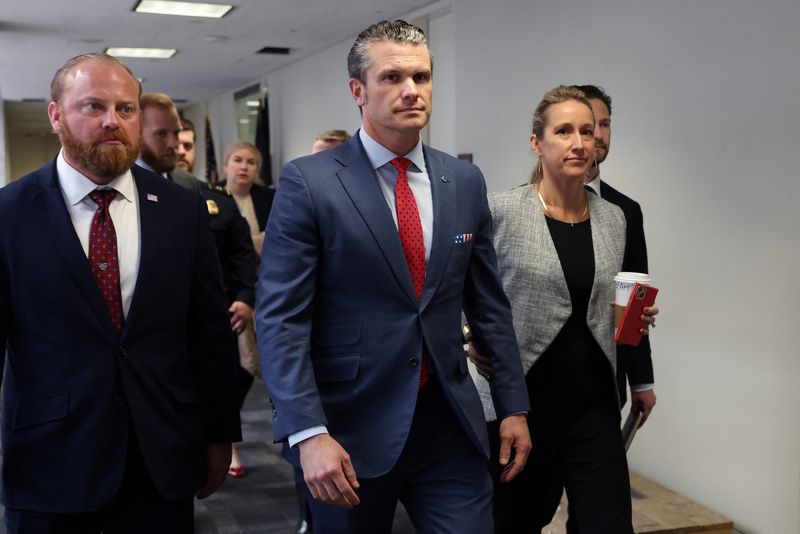By Patricia Zengerle
WASHINGTON (Reuters) -Two of President-elect Donald Trump's most controversial nominees, Pete Hegseth and Tulsi Gabbard, sought support from U.S. senators on Monday, but it remained uncertain whether they would get the near-unanimous Republican backing they will need to win confirmation.
Former Fox News personality Hegseth held a second meeting with Senator Joni Ernst, a combat veteran and sexual assault survivor seen as a key to the decorated Army National Guard veteran's hopes for becoming secretary of Defense.
Ernst's statement afterward seemed to open the door to voting for Hegseth. She said the nominee had committed to completing a Pentagon audit and selecting an official who would address the issue of sexual assault within the ranks.
"As I support Pete through this process, I look forward to a fair hearing based on truth, not anonymous sources," Ernst said.
Hegseth faces concerns about allegations of misconduct in his professional and personal life, including accusations of sexual assault, which he denies. Several of his supporters have called for his accusers to come forward publicly.
Trump has kept his support strongly behind Hegseth, predicting he will be confirmed.
Hegseth told reporters the meeting with Ernst had gone well, saying, "The more we talk, the more we are reminded that we are two combat veterans and we are dedicated to defense."
Trump's fellow Republicans will hold only a slim 53-47 Senate majority next year, meaning nominees can afford just three Republican no's and still be confirmed, if Democrats unite against them.
Former Representative Gabbard, Trump's choice for director of national intelligence, arrived for Senate meetings as the abrupt fall on Sunday of Syrian President Bashar al-Assad prompted renewed scrutiny of her 2017 visit to Damascus.
Gabbard, a former Democrat who lacks significant intelligence experience and in the past had been critical of Trump, is also seen as soft on Russia. However, her supporters say she has a healthy skepticism about foreign U.S. military involvement, in keeping with the America First policies of Trump, whom she endorsed this year.
After his meeting with Gabbard, Senator Mike Rounds said he thought there was "a path forward" for her.
"This is a case of where people will ask her questions about her knowledge of the intelligence community, about the information that's out there. And they'll ask her about some of her past statements with regard to President Trump," Rounds said on Fox News.

Her selection to be director of national intelligence in November sent shock waves through the national security establishment, adding to concerns that the intelligence community would become increasingly political.
Gabbard did not respond on Monday when reporters at the Capitol asked her to respond to events in Syria.